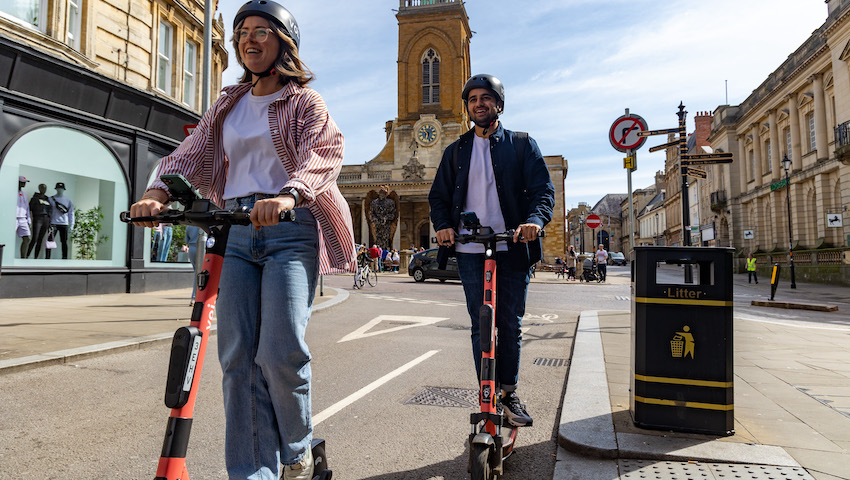E-scooters boost local economies by £53 million, report finds
Voi’s e-scooter scheme has boosted local economies in the UK by £53 million, a new report has revealed.
The report, carried out by Volterra Partners and commissioned by Voi, UK and Europe’s leading micromobility provider, found that shared e-scooters enable more high street visits, while also bringing shoppers and visitors back from retail parks and online shopping to city and town centres in the areas that it operates in.
Voi’s shared e-scooters can be found in 17 towns and cities across the UK, including Bristol, Birmingham, Liverpool, Oxford and Southampton. In the two years since the rental trials launched, Voi riders have taken over 16 million trips – amounting to 24 million miles. By the end of this year, it is estimated that Voi’s presence will have removed at least 6 million independent car trips from the road.
The research shows that e-scooters have also helped to boost food and drink spending at cafes, pubs and restaurants by more than a third (36%). When it comes to food and beverage spending alone, Voi’s e-scooters are expected to lead to a £106 million boost during the four-year trial period, rising to £1.2 billion over the next 60 years in these areas.
The positive impact isn’t just being felt by food and drink establishments. An estimated £8.7 million is expected to be redistributed to the high street from out-of-centre retail parks and online shopping in 2022 because of Voi’s e-scooters, as up to 0.7% of all shopping trips in the trial areas are estimated to be facilitated by shared e-scooter rides. Over a 60-year-period, this works out to £246 million redistributed in total. By the end of this year, Voi riders will spend an estimated £37 million at retail locations on high streets.
According to Voi’s annual rider survey, without the availability of an e-scooter, 36% of respondents said that they would have either shopped online or gone elsewhere. While 47% of users say Voi has allowed them to visit places in the city that they previously didn’t, contributing to vibrant and welcoming towns and cities across the country.
Volterra’s analysis has found that e-scooters have become particularly important for people from low-income areas with nearly one-quarter (24%) of all Voi trips starting and ending in the country’s most deprived areas. As well, with 30% of trips used for commuting, e-scooters are having a positive impact on improving access to employment.
The average salary of Voi users is approximately in line with the wider UK figures. Equitable access to transport is something Voi continues to champion with initiatives such as its Voi 4 All which provides low-income riders with a 50% discount on Voi passes as well as discounts to NHS staff, emergency service workers, military personnel and veterans.
By encouraging people to leave behind their cars and take an e-scooter for inner city journeys, Voi’s shared e-scooters have a positive economic benefit on local areas in other ways. Journeys taken by e-scooter instead of cars could result in up to £82 million in savings through reducing traffic and maintenance costs (decongestion benefits) if the shared schemes were made permanent beyond 2024. A further £2.4 million could be realised in the reduction of greenhouse gas emissions as well as nearly £33 million through improving air quality.
Altogether, these cumulative benefits, including environmental, decongestion and high street spend, add up to £53 million across all the Voi trial areas in 2022 alone.
Matthew Pencharz, Head of Policy in UK and Ireland at Voi, said: “Since we launched our first e-scooter scheme in August 2020, we’ve seen incredible rider adoption, enabling people to use affordable, sustainable transport in their daily lives and spreading the benefits of micromobility across the UK.
“This research gives us evidence that we are achieving what we set out to do at Voi – creating cities made for living by encouraging people to get out of their houses and cars and experience their local areas – and at the same time reducing the harmful effects of powering transport with fossil fuels.
“We’re only scratching the surface of what is possible with micromobility in the UK. Hopefully, more people will get to enjoy the economic and sustainability benefits of shared e-scooters beyond 2024.”
Richard Dilk, Chief Executive of CoMo UK (a national body dedicated to promoting the public benefit of shared transport), said: “We are pleased to see this insight into the economic and growth impacts of shared escooter operations. The schemes’ popularity and ability to provide low-carbon transport options have been well demonstrated – and will be examined in a forthcoming CoMoUK report – so it is exciting to see research such as this investigating other aspects of the schemes.
“We regard e-scooter legalisation as a high priority for Government, the UK being the only developed country without escooter legalisation or committed plans for it.”
Marvin Rees, Mayor of Bristol, said: “E-scooters are now an important part of our city’s modern, sustainable transport mix. It’s encouraging to see the impact they are having on Bristol’s local economy: giving many of our residents the freedom to hop on and off across the city, enabling them to get to work, study and leisure destinations.
“We are living in a climate emergency. E-scooters, along with walking, cycling and public transport, offer realistic alternatives for day-to-day car use and will help us reduce air pollution and carbon emissions.”






